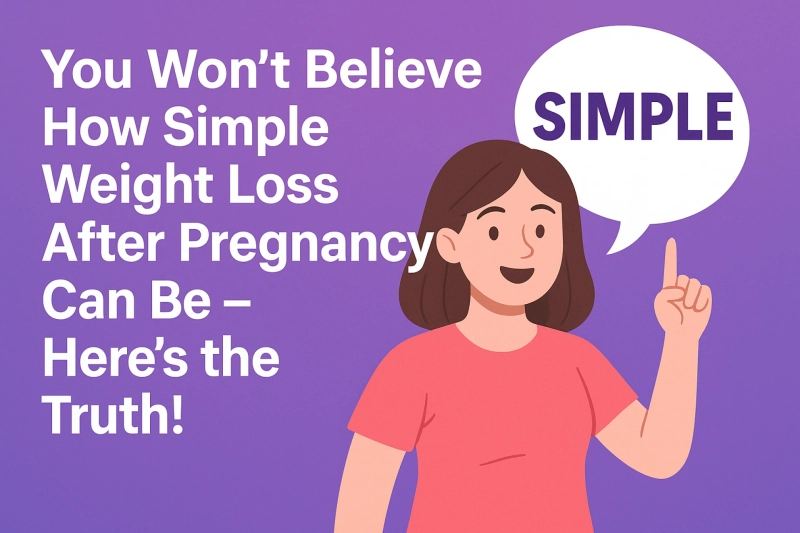Pregnancy is a beautiful journey, but let’s be honest – the changes your body undergoes can be overwhelming. Among the top concerns for new moms is weight loss after pregnancy. Shedding those post-baby pounds may seem daunting, but with the right strategy, it’s absolutely achievable—without crash diets or endless workouts. In fact, many women are surprised by how natural and sustainable the process can be when guided by proper knowledge and realistic goals.
Let’s dive into proven strategies, realistic timelines, and safe methods to help you feel like yourself again—strong, healthy, and confident.
Understanding Postpartum Weight Retention
It’s important to acknowledge that every woman’s body reacts differently to pregnancy. Weight gained during pregnancy is meant to support your baby’s growth, provide energy stores, and prepare your body for breastfeeding. Typically, women gain around 25-35 pounds during pregnancy. After delivery, it’s normal to lose 10-15 pounds right away. The remaining weight may take time to come off—and that’s perfectly okay.
Don’t compare yourself to celebrities who bounce back within weeks. Focus on what’s healthy and right for your body.
Why Crash Diets Don’t Work Post Pregnancy
Quick-fix weight loss diets can be harmful, especially for new mothers. Your body needs time to heal, and you need proper nutrition to maintain your energy levels—especially if you’re breastfeeding. Restricting calories too soon can lead to fatigue, mood swings, and reduced milk supply.
Instead of cutting calories drastically, focus on a nutrient-rich diet and gentle activity to support natural weight loss after pregnancy.
7 Effective and Safe Tips for Weight Loss After Pregnancy
1. Breastfeeding Can Support Weight Loss
Breastfeeding isn’t just beneficial for your baby—it also helps you burn calories! Nursing moms burn up to 500 extra calories a day, which can contribute to gradual and steady weight loss. Be sure to nourish yourself with healthy foods to maintain your milk supply.
2. Start with Gentle Movement
In the early weeks postpartum, even simple movement like walking can help. Once your doctor gives the go-ahead (usually around 6 weeks postpartum), you can add light workouts like yoga, Pilates, or postpartum-specific exercise routines to strengthen your core and pelvic floor.
3. Eat Whole, Nutrient-Dense Foods
Focus on whole grains, lean protein, fruits, vegetables, and healthy fats. Avoid sugary snacks and processed foods, which can lead to energy crashes and unwanted weight gain. Meal prepping can help you avoid reaching for unhealthy convenience foods.
4. Stay Hydrated
Drinking enough water helps with digestion, flushes out toxins, and can even curb unnecessary snacking. Aim for at least 8-10 glasses of water a day, especially if you're breastfeeding.
5. Prioritize Sleep (As Much as You Can)
Sleep deprivation can mess with your metabolism and increase cravings for junk food. While it's tough with a newborn, try to nap when the baby naps and accept help from family or friends when available.
6. Incorporate Strength Training
Once you’re cleared for exercise, incorporate resistance workouts. Building muscle helps boost metabolism and shapes your body. Start with bodyweight exercises like squats, lunges, or gentle core workouts before progressing to weights.
7. Set Realistic Goals and Be Patient
Healthy weight loss after pregnancy is about 1-2 pounds per week. Give yourself at least 6 months to a year to gradually lose the baby weight. The goal is long-term health, not short-term results.
Myths Around Postpartum Weight Loss
Let’s bust some common myths that often mislead new moms:
- Myth: You must lose all the baby weight in 3 months.
- Fact: Every body is different. Rushing weight loss is unhealthy.
- Myth: Breastfeeding alone will make the weight melt away.
- Fact: While helpful, diet and exercise still play major roles.
- Myth: You can’t exercise if you had a C-section.
- Fact: Gentle movement is possible after your doctor clears you.
Mental Health and Self-Love Matter Too
Postpartum recovery isn’t just about the physical—it’s emotional too. Many new moms feel pressure to “bounce back” quickly. Remember, your body grew a human. Celebrate your strength and be kind to yourself. Practicing mindfulness, journaling, or speaking with a therapist can help you navigate this time with compassion and clarity.
Creating a Sustainable Postpartum Routine
A good routine includes:
- Meal Planning: Avoid last-minute unhealthy choices.
- Mini Workouts: 10–15 minutes is better than nothing.
- Accountability: Join a postpartum fitness group or find a mom buddy.
- Tracking Progress: Celebrate non-scale victories like increased energy or better sleep.
When to Seek Medical Guidance
If your weight isn’t budging despite a balanced lifestyle, or if you’re feeling excessively tired or down, speak with your healthcare provider. Thyroid issues and postpartum depression can affect weight loss and general well-being.
Conclusion: Progress Over Perfection
Achieving weight loss after pregnancy doesn’t require extreme dieting or gym marathons. It’s about nourishing your body, moving mindfully, sleeping when you can, and showing yourself grace along the way. The goal is to be the healthiest version of yourself for both you and your baby.
So take a deep breath, embrace the journey, and remember: you’ve already done something amazing. Now, it’s time to reclaim your strength—step by step.


